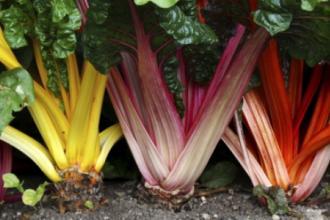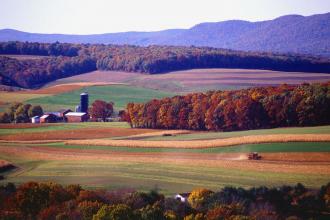
Organic Agriculture
Organic production is a system that integrates cultural, biological, and mechanical practices that foster cycling of resources, promote ecological balance, and conserve biodiversity.
On this page, find subject guides, legislation and regulations, production information, oral histories, and other resources for farmers and ranchers.
Find Information
-
ATTRA Organic [attra.ncat.org]
National resource for producers interested in organic production.
-
SARE Organic Production [sare.org]
Topic rooms provide organic information, and publications on pest management, seed and stock selection, whole-farming systems, marketing, conservation practices, transitioning to organic, organic certification, and more.
-
eOrganic
A website for farmers, ranchers, agricultural professionals, certifiers, researchers and educators seeking information on organic agriculture, published research results, farmer experiences, and certification.
-
Introduction to Organic Farming [usda.gov]
An overview of common practices organic producers and handlers use to ensure organic integrity and operation sustainability.
Find Funding Resources for Organic Agriculture
- How does USDA support Organic Farms and Businesses? [usda.gov, pdf, 4.5mb] details USDA programs available for organic certification guidance, biodiversity and natural resources conservation, financial and production assistance and marketing.
- Consult Growing Opportunity: A Guide to USDA Sustainable Farming Programs [fas.usda.gov] for an overview of key Farm Bill programs offered by USDA that can help sustainable agriculture farmers and ranchers.
- Review the Grass Roots Guide to Federal Farm and Food Programs [sustainableagriculture.net] for an in-depth look at federal programs and policies important to sustainable agriculture. Fine details on access for farmers, ranchers, and grassroots organizations nationwide.
- Building Sustainable Farms, Ranches and Communities [sare.org] is the Guide to Federal Programs for Sustainable Agriculture, Forestry, Entrepreneurship, Conservation, Food Systems and Community Development.
Find more Agricultural Funding Resources.
Crops and Gardening Techniques
Explore Books Online
New Roots for Agriculture (1980)
The Organic Method on the Farm (1949)
The Soil and Health: A Study of Organic Agriculture (1947)
Tracing the History of Organic/ Sustainable Agriculture (1988)
Explore the History of Organic Agriculture
A Brief Overview of the History and Philosophy of Organic Agriculture [kerrcenter.com. pdf, 605kb] reports on the origins of the organic agriculture movement, legislative developments and regulations, and organic farming and foods.
The 1980 Report and Recommendations on Organic Farming [usda.gov, pdf, 10.4kb] summarizes findings of a comprehensive study and assessment of organic farming in the United States and Europe.
Cultivating a Movement: An Oral History Series on Sustainable Agriculture and Organic Farming on California's Central Coast [ucsc.edu] features interviews with farmers, activists, researchers, and educators. It covers encompasses 1960's through 2010.
The Organic Farming Research Foundation's 2004 survey of organic farmers in the United States offered insight into "organic farmers' experiences, attitudes and needs around marketing organic products." Read the Final Results of the Fourth National Organic Farmers' Survey: Sustaining Organic Farms in a Changing Organic Marketplace [agmrc.org, pdf, 761kb].
Selected Literature on the Origins of Organic Agriculture
Discover the philosophical and scientific roots of sustainable, regenerative agriculture through readings dating from the 1500s. Below are selected resources from the National Agricultural Library's Tracing the Evolution of Organic/Sustainable Agriculture (2007 updated and expanded; archived) and (1988, archived)
Five Hundred Points of Good Husbandry. [archive.org] Tusser, Thomas (1524?-1580). London: H. Denham, 1580. 4p., 289 numbered leaves, 2p. Complete title: Fiue hundred pointes of good husbandrie, as well for the champion, or open countrie, as also for the woodland, or seuerall, mixed in eurie month with huswiferie, ouer and besides the booke of huswiferie, corrected, better ordered, and newly augmented to a fourth part more, with diuers other lessons, as a diet for the farmer, or the properties of winds, planets, hope, herbes, bees, and approoued remedies for sheepe and cattle, with many other matters both profitable and not vnpleasant for the reader: also a table of husbandrie at the beginning of this book: and another of huswiforie at the end: for the better and easier finding of any matter contained in the same. In verse.
NAL Call no: 30.8 T87 1580
Full-text: Internet Archive
Annotation: This classic has been reprinted almost every century since its original publication. Tusser’s maxims include observations of human behavior - “Still crop’ upon crop many farmers do take and reap little profit, for greediness sake... 11, observations concerning the land” and “land (overburdened) is clean out of heart,” or “if land be unlusty, the crop is not great.” He also gives advice by the month, frequently in rhyme. “Octobers Abstract” is about the rotation of crops: “Where barlie did growe, laie wheat to sowe, yet better I thinke, sowe pease, after drinke. And then if ye please, sowe wheat after pease.” [Annotated by Jane Potter Gates]
Organic Chemistry and its Application to Agriculture and Physiology. [archive.org] Liebig, Justus Freiherr von (1803-1873). London: Taylor and Walton, 1840. 407p. Edited from the manuscript of the author by Lyon Playfair. Translated from the German, Organische Chemie in ihrer Anwendung auf Agricultur und Physiologie. Includes bibliographical references.
NAL Call no: 395 L62O
Full-text: Internet Archive
Annotation: Liebig’s work established basic chemical requirements for agricultural production and plant nutrition. His discoveries, coupled with those of Sir Humphrey Davy (Elements of Agricultural Chemistry, 1813) reduced the soil-plant relationship to chemical reactions and an agricultural “revolution” was begun. By the 1940s, large-scale use of synthetic chemical fertilizers had become mainstream. Liebig’s legacy marks the divergent paths of “conventional” and organic agriculture. [Annotated by Mary V. Gold.]
The Field Book of Manures, or, the American Muck Book: Treating of the Nature, Properties, Sources, History, and Operations of All the Principal Fertilisers and Manures in Common Use, with Specific Directions for Their Preparation, Preservation, and Application to the Soil and to Crops; as Combined with the Leading Principles of Practical and Scientific Agriculture; Drawn from Authentic Sources, Actual Experience, and Personal Observation.[archive.org] Browne, Daniel Jay (1804-1867?). New York: C.M. Saxton and Company, Agricultural Book Publishers, 1855 (oldest edition held by the National Agricultural Library). xii, 5, 422p. Illustrated with engravings.
NAL Call no: 57 B81
Full-text: Internet Archive (accessed 2021-11-09)
Annotation: As the book title indicates, Browne presents information pertaining to soil productivity through incorporation of organic matter. He served as head of the agricultural division of the Patent Office from June 9, 1853, through 1859. He also published a book calling for native tree planting directed especially at farmers. [Annotated by Mary V. Gold.]
The Formation of Vegetable Mould Through the Action of Worms with Observations on their Habits. [archive.org] Darwin, Charles Robert (1809-1882). London: Murray, 1945. Reprint of the 1881 publication.
NAL Call no: 56.12 D45
Full-text: Soil and Health Library, Steve Solomon (accessed 2021-11-09)
Annotation: The real foundation for “the study of the principles underlying farming and gardening...” [Annotated by Jane Potter Gates.]
The Conservation of Natural Resources. [archive.org] Pinchot, Gifford (1865-1946). Washington DC: U.S. Dept. of Agriculture, 1908. 12p. (Farmers’ Bulletin, 327)
NAL Call no: 1 Ag84F no.327
Full-text: Organic Roots, Organic Agriculture Information Access.
Annotation: “We shall decide whether their [our children] lives, on the average, are to be lived in a flourishing country, full of all that helps to make men comfortable, happy, and strong, and effective, or whether their lives are to be lived in a country like the miserable outworn regions of the earth which other nations before us have possessed without foresight and turned in to hopeless deserts. We are no more exempt from the operation of natural laws than are the people of any other part of the world.” p. 12. Pinchot addresses not only the status and future of forest and soil resources in the United States, but “Waste through piecemeal planning” and the “Danger of monopoly.” [Annotated by Mary V. Gold.]
Bio-dynamic Farming and Gardening: Soil Fertility Renewal and Preservation. [cornell.edu] Pfeiffer, Ehrenfried (1899-1961). New York; London: Anthroposophic Press; Rudoff Steiner Pub. Co., 1938. vii, 2 leaves, 220p. Translated from the German, Die Fruchtbarkeit der Erde (1937), by Fred Heckel. Bibliography, p. 217-220. 18 illustrations.
NAL Call no: 30 P47
Full-text: (American edition) Core Historical Literature of Agriculture, Cornell University, (accessed 2021-11-17)
Annotation: Based on Steiner’s approach, this book stresses the importance of the “life process (biological process),” with the farm or garden a biological organic unit, not a series of unconnected processes. [Annotated by Jane Potter Gold.]
Access to Research Articles
Search the NAL Collections
Featured Resources
National Agricultural Law Center

The Center connects users to legislation, research, resources and publications pertinent to organic agriculture.
Organic Roots Collection

This digital collection aims to harness the information from our agrarian roots to ensure the sustainability and longevity of today’s small farms.
Pioneers in Sustainable Agriculture

Oral history interviews with individuals who have provided leadership, influence, or inspiration in the disciplines of alternative and/or sustainable agriculture.
 An official website of the United States government.
An official website of the United States government.